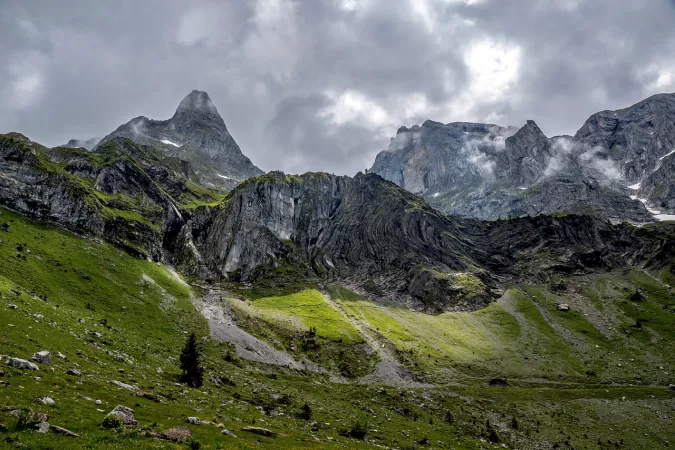
Jalori Pass
Duration
2 to 4 Days
2 to 4 Days
Best time to visit
May-Jun, Sep-Oct
May-Jun, Sep-Oct
Theme
Hill Station, Adventure
Hill Station, Adventure
Jalori Pass Travel Guide
Jalori Pass, located in the Indian state of Himachal Pradesh, is a picturesque mountain pass situated at an elevation of 10,800 feet above sea level. Known for its breathtaking views of the Himalayas, lush greenery, and serene atmosphere, Jalori Pass is a popular destination for nature lovers and adventure enthusiasts. The pass also holds historical significance as it was once a significant trade route between the Kullu and Shimla districts.Top Attractions in Jalori Pass
1. Serolsar Lake 2. Raghupur Fort 3. Trekking and Camping 4. Jalori Mata Temple 5. Shoja VillageJalori Pass is Famous for
Its pristine natural beauty and panoramic views of the snow-capped Himalayan peaks.Top Attractions in Jalori Pass
- Serolsar Lake - Raghupur Fort - Trekking and Camping - Jalori Mata Temple - Shoja VillageWhat's Great about Travelling to Jalori Pass?
- Ideal for nature lovers and adventure seekers - Perfect for a peaceful and tranquil getaway - Offers stunning views of the HimalayasWhat's Not So Great about Travelling to Jalori Pass?
- Limited accommodation options - Remote location may not be suitable for travelers seeking urban amenities - Harsh weather conditions during winter monthsTravel Tips for Jalori Pass
- Carry sufficient warm clothing, especially during winters - Plan your accommodation in advance due to limited options - Be prepared for steep and narrow roads while driving to the passImportant Jalori Pass trip information
- Ideal Duration: 2-3 days
- Best Time to Visit: April to June and September to November
- Nearby Airports and Railway Stations: The nearest airport is Bhuntar Airport, and the closest railway station is Shimla Railway Station.
FAQ's on Jalori Pass
Q1: What is the best time to visit Jalori Pass?
The best time to visit Jalori Pass is during the summer months from April to June when the weather is pleasant and ideal for outdoor activities like trekking and sightseeing. The monsoon season from July to September should be avoided due to heavy rainfall, which can lead to landslides. Winter from October to March offers a different experience with snowfall, making it a popular destination for snow lovers.
Q2: Do I need a visa to travel to Jalori Pass?
Jalori Pass is located in India and accessible by road. Foreign tourists visiting India need to apply for an Indian tourist visa before their trip. Make sure to check the visa requirements based on your nationality and travel plans. Some nationalities may be eligible for e-visas or visa-on-arrival, but it's essential to confirm the latest regulations before traveling.
Q3: What are the must-visit attractions in Jalori Pass?
Jalori Pass offers breathtaking views of the Himalayas and is a paradise for nature lovers and trekkers. Some of the must-visit attractions include the Serolsar Lake, a pristine high-altitude lake surrounded by forests, and the Jalori Mata Temple, a sacred site with panoramic views. Trekking routes like the Jalori Pass Trek and Raghupur Fort are also popular among adventure enthusiasts.
Q4: Is Jalori Pass a safe place to travel?
Jalori Pass is generally safe for travelers. However, it is advisable to check local weather conditions before visiting, especially during the winter months when snowfall can affect road accessibility. It's recommended to travel with a local guide if you plan on trekking or exploring remote areas. As with any travel destination, it's essential to take normal precautions, such as safeguarding your belongings and being aware of your surroundings.
Q5: What is the local currency in Jalori Pass and can I use credit cards?
The local currency in Jalori Pass is the Indian Rupee (INR). While some hotels and larger establishments may accept credit cards, it's advisable to carry cash for smaller purchases and in remote areas. ATMs are limited in this region, so it's recommended to withdraw sufficient cash before traveling to Jalori Pass.
Q6: What is the local cuisine like in Jalori Pass?
The local cuisine in Jalori Pass reflects the traditional Himachali flavors with dishes like Sidu, a steamed bread, and Dham, a festive meal served on special occasions. Don't miss trying local favorites like Chha Gosht (lamb curry) and Mittha (sweet rice). Vegetarian options like Madra (chickpea curry) are also popular. Make sure to savor the local tea, known as "Kadak Chai," and indulge in freshly baked goods from local bakeries.
Q7: What transportation options are available in Jalori Pass?
Transportation options in Jalori Pass include buses, taxis, and private vehicles. The pass is well-connected by road, and buses ply from nearby towns like Shimla and Kullu. Taxis and private cabs are available for hire for more flexibility in exploring the region. For those seeking adventure, self-drive car rentals are also an option. Keep in mind that road conditions can be challenging, especially during the winter months, so it's advisable to travel with experienced drivers.
Q8: Are there any cultural norms or etiquette I should be aware of when visiting Jalori Pass?
When visiting Jalori Pass, it's essential to respect the local customs and traditions. Covering your head when entering religious sites like temples is appreciated. Avoiding public displays of affection and dressing modestly is recommended, especially in rural areas. Greeting locals with a "Namaste" and showing courtesy towards elders is considered polite. It's customary to remove your shoes before entering homes or temples. Taking photographs of people should be done with permission out of respect for their privacy. Embracing the local culture and being mindful of your actions will enhance your travel experience in Jalori Pass.
Q9: I am a travel agent. How can I buy travel leads of Jalori Pass?
Register yourself as a travel agent at agents.tripclap.com and then you can buy travel leads to Jalori Pass once your account is approved. For more details contact our support team at +91-8069186564 or support@tripclap.com
